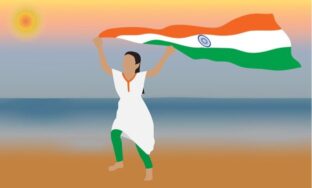October 1929, Ahmedabad
This was just the beginning.
Bansari knew that. Kakuchand, her husband, who worked as a manservant in one of the British officer’s house, was thrown out from his job. A job that he loved, because it gave him enough to drink away his nights.
With each passing day, Bansari’s screams drowned all other voices in the neighborhood.
She had taken up odd jobs to keep the house running. It was becoming difficult, as prices were soaring. Even salt was expensive.
She was aware of people fighting against the British, and she always wished to join them. But Kakuchand would burn her alive, if she even voiced that thought.
The abuse was becoming unbearable. Someone at work told her about an ashram in the suburbs of the city that supported women. She walked those 7 kilometers, unbeknownst to Kakuchand.
The moment she limped into the ashram, her jaw dropped open. She saw a few girls huddled together in front of a blackboard, repeating the alphabets with the teacher. On another side, there was a small farm with a few animals. The smell of the dung and the fields gave her a sense of calm.
“Are you here to meet Ba?” The teacher who was with the girls, asked her.
Bansari looked at her, clueless. The lady took her to a small room, where an old woman was sitting on a cot, coughing.
“Ba?” Bansari asked, unsure.
“Excuse me. I’m not keeping well these days.” Ba said while noticing the bruised face. “Tell me about yourself.”
Bansari regaled her story. Married at 15, childless, her husband’s loss of income and the wounds that he inflicted on her.
“What about you?” Ba asked.
Bansari gaped like a fish and stammered, “M…Me?” No one had asked that before.
“Yes, you. Your dreams.”
So, she told Ba about her wish. Ba smiled. Then, Bansari walked out of that room with a spring in her step.
Over the next few months, she visited the ashram every other day to meet Ba and help in the farm. Each meeting with Ba sparked a fire within her. She also started learning the alphabets.
Her husband was oblivious to her whereabouts. As long as she was home in the nights, he didn’t bother.
It was March 1930. There was a lot of hullabaloo over the arrival of Mahatma Gandhi at the ashram. Bansari looked forward to meeting him.
One morning, Ba called her. “Bansari, remember your wish? The time has come. This is your chance. Go with my husband, Mohandas, to Dandi. March for freedom. For yours and India’s.”
Bansari broke down. How couldn’t she recognize this woman in front of her since so many months? Kasturba Gandhi. The emancipator of women.
“Yes, I will.” Bansari said, determined.
Leaving Kakuchand behind, she participated in the onset of the civil disobedience movement. As she marched behind Gandhi, she knew one thing for sure.
This was just the beginning.
Glossary
Ba: Mother in Gujarati.
***
Photo By: Murthysnraj
***
This is an entry for Five00-7, a writing event hosted by ArtoonsInn. Check out the event prompt and guidelines here: https://writers.artoonsinn.com/five00-7/
Use the tracker to record your rulfy progress: https://1drv.ms/x/s!ApiLwn00sMcLgw25_MChxGCrua9_








